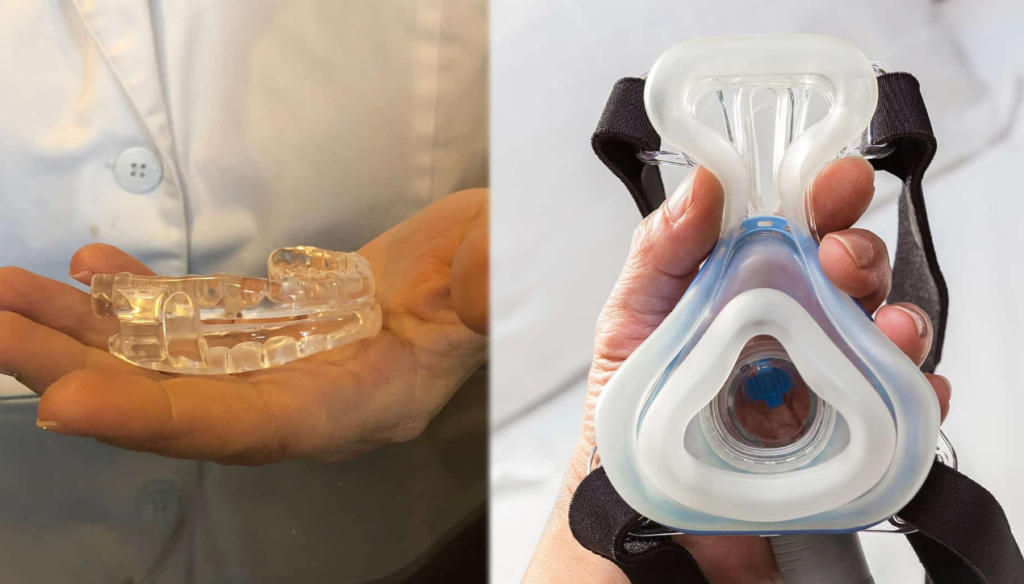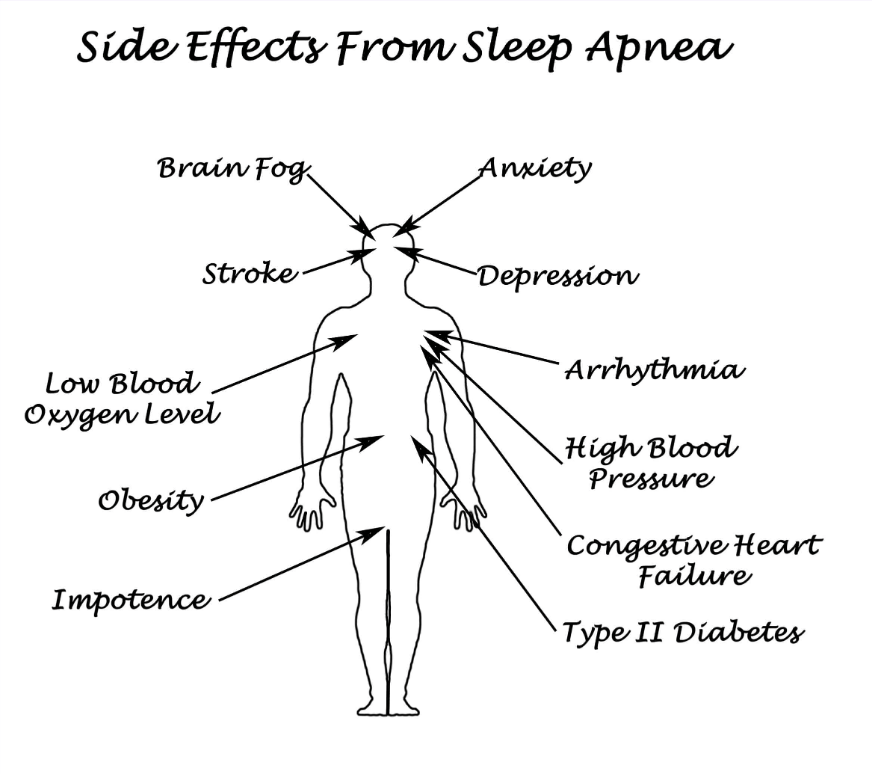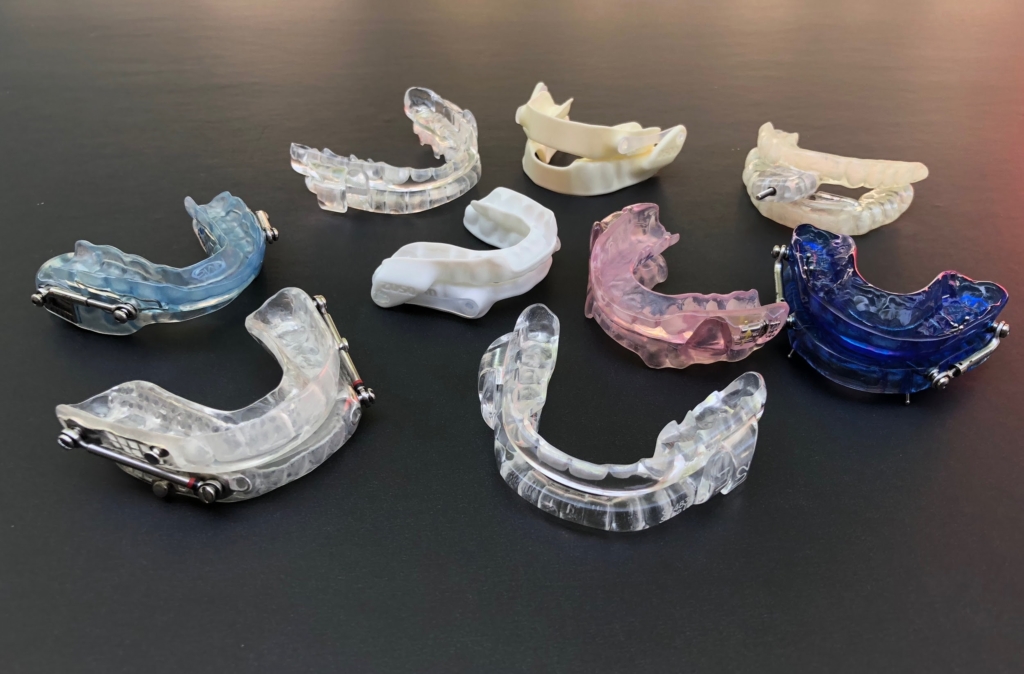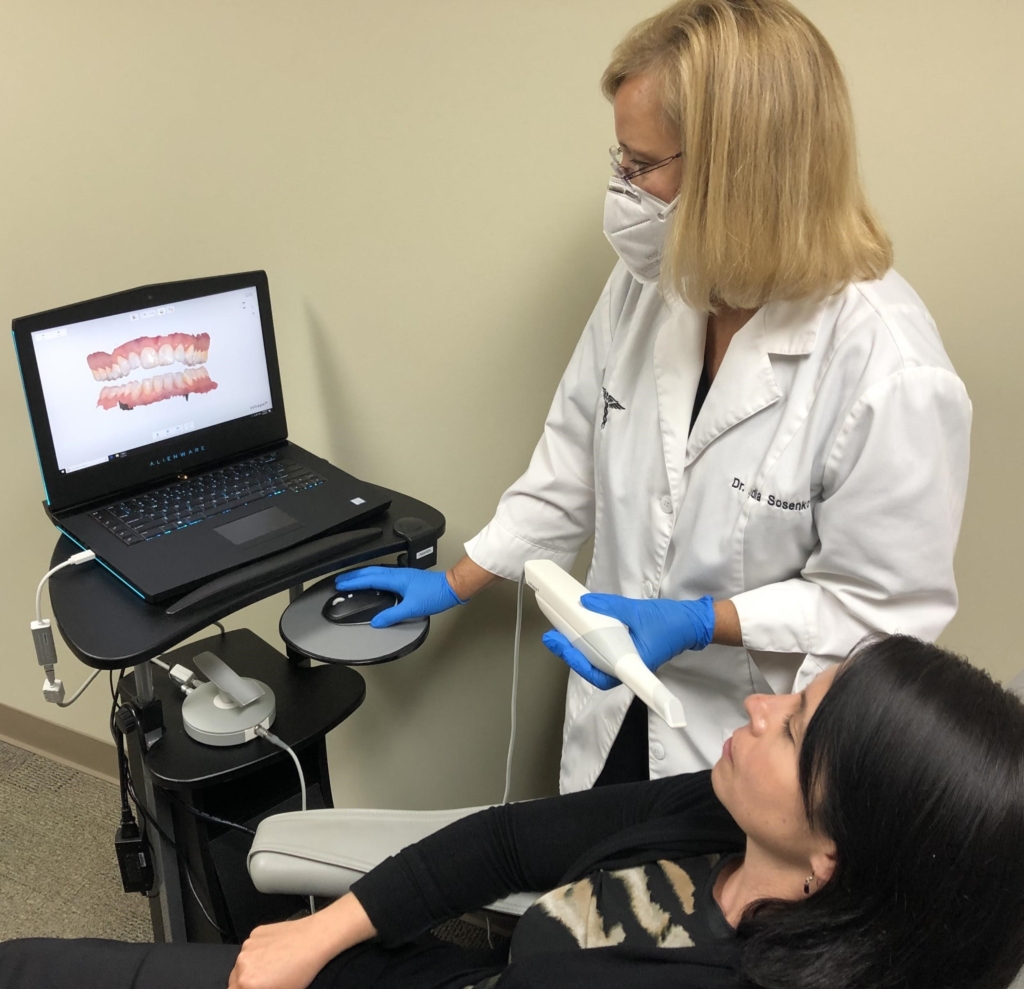Frustrated with CPAP treatment?
Consider a Sleep Apnea Dental Device

Have you been diagnosed with obstructive sleep apnea (OSA) but frustrated with your CPAP? Are you sleeping more poorly than before treatment?
Let’s explore another well-researched and commonly prescribed treatment option, oral appliance therapy.
Many of our sleep center’s patients have transformed their sleep and lives with the help of CPAP therapy (Continuous Positive Airway Pressure) or similar air-breathing sleep devices. But a considerable portion of sleep apnea patients struggle with their prescribed CPAP devices.
If you are one of these struggling patients, let’s explore if a custom dental sleep device may be a better option to peaceful sleep.
The area of treatment of obstructive sleep apnea that involves custom fabrication of dental mouth guards is called oral appliance therapy.
Oral appliance therapy involves treating snoring and apnea with small custom devices worn in the mouth during sleep that resemble sports mouthguards. These dental devices have a specialized mechanism that gently stabilizes your lower jaw in a slightly forward position maintaining an open airway.
Oral appliances are fabricated through the guidance of a dentist with specialized training in airway breathing disorders.
The Center for Sleep Medicine has a team of American Board of Dental Sleep Medicine diplomates who have vast experience in treating snoring and sleep apnea using oral appliance therapy.
Let’s review some common questions and answers that patients often ask when considering dental devices for snoring and apnea treatment.
1. How do oral appliances work?
Oral appliances reposition the lower jaw and tongue gently forward, preventing the airway from collapsing while maintaining an open airway.

The goal of oral appliance therapy (OAT) is to prevent dangerous oxygen-starved blood dips as well as to reverse the common symptoms associated with obstructive sleep apnea (OSA).
The most common symptoms of OSA patients include snoring. Not all, but most OSA patients snore on some level.

In addition to snoring, many OSA patients also have one or more of the following symptoms:
- Daytime sleepiness
- Poor sleep quality
- Morning headaches
- Depression
- High blood pressure
- Pulmonary hypertension
- Cerebrovascular Disease
- Cardiac Arrhythmia
- Myocardial Ischemia
- Higher incidence of strokes
- Erectile Dysfunction
- Gastro-esophageal reflux disease (GERD)
- … and more
As with successful CPAP therapy, successful oral appliance therapy eliminates or reduces OSA symptoms, blood oxygen depleting events and sleep disruptions.
Oral appliances may be worn alone or in combination with other treatments such as:
- Weight management
- Nasal surgery
- CPAP and positional devices
2. Who are good candidates for oral appliances?
The sleep specialists at The Center for Sleep Medicine follow the recommendations of the American Academy of Sleep Medicine.
Oral appliances are suitable for patients who:
- Snore and score under the level to be diagnosed with obstructive sleep apnea, but have symptoms similar to OSA
- Been diagnosed with OSA and have abandoned CPAP therapy due to frustration or lack of success
- Are interested in alternatives to CPAP therapy

Additionally, successful CPAP users may also use dental sleep appliances.
Here are some reasons why successful CPAP users may be candidates for oral appliance therapy:
- Travel ease
- Relief of skin irritations
- More freedom for various sleeping positions
CPAP users who miss sleeping on their stomachs or crave a night without battling hoses and sleep confinement issues may choose to seek oral appliance therapy as well.
To learn more circumstances that CPAP users turn to sleep apnea dental devices, read: 6 Reasons CPAP Users Turn to Custom Dental Mouthguards for Sleep Apnea
From a dental standpoint, the following individuals are often found to be good candidates for oral appliances. Patients that exhibit:
- Stable dental condition
- History of teeth grinding
- History of TMJ, but are currently pain-free or have slight jaw discomfort
- Have at least 8 teeth each on top and lower jaw
- Are open to wearing dental retainer
3. How do I find out if I am a good candidate for a dental sleep device?
Our sleep specialists will review your diagnosis and determine if an oral appliance is a suitable option for you.
If it is determined that OAT may benefit you, our team of medical sleep disorder specialists will refer you to one of our dental sleep medicine providers or refer you back to your general dentist if he or she is a dental sleep medicine provider.
Each of our dental sleep medicine providers has vast experience providing relief of snoring and apnea with oral appliance therapy. They will guide you through the process of obtaining a custom dental sleep mouthguard.
4. What does the process of obtaining a sleep apnea dental device look like?
The process of receiving an oral appliance is painless and requires just a few appointments.
After a thorough oral evaluation, our sleep medicine dental providers will determine if oral appliance therapy is suitable as an option.
He or she will take custom dental impressions and record necessary records.
All of our dentists are able to digitally scan patients’ teeth in place of taking traditional dental impressions for added comfort and a higher level of accuracy..

Usually, at the 2nd appointment, you will receive one of several custom oral appliance choices. You will soon be on your way to having a restful night’s sleep. Additionally, two to three appointments will guide you through the process of maximizing the effects of the device.
Once your symptoms are resolved, (snoring, frequent awakenings, etc) a sleep test may be prescribed to validate the oral appliance’s effectiveness on stopping or decreasing the number of apnea oxygen events you experience while you are sleeping.
After receiving a device, we encourage good dental health practices and recommend you continue seeing your general dentist regularly.
5. How do oral appliances compare to CPAP effectiveness?
On average, dental sleep appliances are effective in approximately 70-85% of cases.
Although CPAP therapy is considered almost 100% effective, many people struggle with using their CPAP machine and want to find a better alternative for their lifestyle.
Oral appliances, on the other hand, are more easily worn for many patients.
According to the research article Efficacy versus Effectiveness in the Treatment of Obstructive Sleep Apnea: CPAP and Oral Appliances (Sutherland, Phillips & Cistulli, 2015), oral devices overall stack up quite high in overall health outcome when compared to CPAP therapy.
While CPAP therapy is more effective when worn correctly, oral devices have a higher compliance rate because they are often worn for more hours than CPAP. In these, making the OAT a better choice for some patients in reducing sleep apnea symptoms.
6. How do I get started in obtaining a dental sleep apnea device?
If you have stopped using your CPAP or are looking for a well-researched and commonly prescribed CPAP alternative, oral appliance therapy may be your best option for sleep apnea and snoring treatment.
For more information and to learn how sleep apnea dental devices can help you, reach out to us by calling (708)397-8482 or request an appointment. We have 5 locations to serve you and will help determine which location is closest to you.
One of our sleep specialists will determine if oral appliance therapy is an option for you, and guide you through your next steps on how to have a peaceful, restorative sleep. For more information on oral appliance therapy including photos and videos visit MySleepDevice.com, an educational oral appliance website authored by Dr. Lydia Sosenko, DDS, D’ABDSM, one of our dental oral appliance providers here at The Center for Sleep Medicine.
